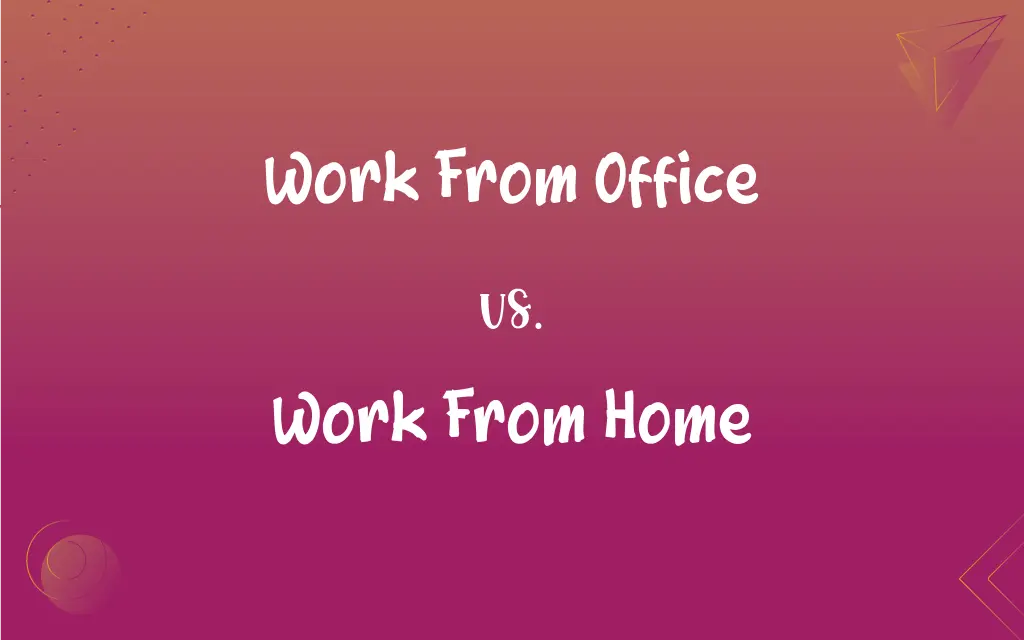Work From Office vs. Work From Home: What's the Difference?
Edited by Aimie Carlson || By Janet White || Published on December 8, 2023
Work from office involves performing job duties in a designated workplace, while work from home means doing professional tasks from one's residence.

Key Differences
Work from office refers to the traditional model where employees commute to a designated workplace, such as an office building. This environment usually offers a structured routine and direct interaction with colleagues. In contrast, work from home allows employees to perform their job duties from their residence, offering flexibility in terms of location and often in work hours.
The work from office setting often provides specific resources, equipment, and a professional environment conducive to certain types of work. Work from home, however, requires employees to set up their own work environment, which can vary greatly in terms of space, equipment, and resources.
In a work from office scenario, employees have the opportunity for face-to-face collaboration and immediate communication with coworkers. Work from home relies heavily on digital communication tools and requires a greater emphasis on virtual collaboration and self-motivation.
The work from office model can offer a clear separation between professional and personal life, which some find beneficial for work-life balance. Work from home, while offering flexibility, can sometimes blur the lines between personal and professional time, requiring strong time-management skills.
Work from office can involve commuting, which might add travel time and costs, but also provides a consistent daily routine. Work from home eliminates commuting, offering savings in time and travel expenses, but may require self-discipline to maintain a consistent work schedule.
ADVERTISEMENT
Comparison Chart
Location
Designated workplace (e.g., office building).
Residence or any chosen location.
Work Environment
Structured, provided by the employer.
Self-arranged, varies greatly.
Collaboration
Direct, face-to-face interaction.
Primarily digital and virtual.
Work-Life Separation
More defined separation.
Potential overlap of personal and professional life.
Commuting
Usually involves daily travel.
No commuting required.
ADVERTISEMENT
Work From Office and Work From Home Definitions
Work From Office
Work from office can foster direct communication with coworkers.
Brainstorming sessions are more dynamic in their work from office environment.
Work From Home
Work from home eliminates daily commuting and related expenses.
Working from home saves him two hours of commuting each day.
Work From Office
Work from office often means using company resources and equipment.
The work from office setup includes a high-speed internet and ergonomic chairs.
Work From Home
Work from home involves completing professional tasks from one's residence.
He enjoys the flexibility that work from home offers.
Work From Office
Work from office involves performing job duties in a company-provided workspace.
She prefers work from office for the team collaboration it offers.
Work From Home
Work from home requires effective digital communication tools.
Successful work from home relies on regular video conferencing with the team.
Work From Office
Work from office typically includes a consistent daily routine.
His work from office starts with a morning meeting at 9 am.
Work From Home
Work from home can blur the lines between personal and professional life.
Balancing work from home and family time can be challenging.
Work From Office
Work from office usually involves commuting to and from work.
Her work from office is downtown, a 30-minute commute each way.
Work From Home
Work from home allows for a flexible schedule and environment.
She appreciates being able to work from home and adjust her hours as needed.
FAQs
What is work from home?
Completing professional tasks from one's residence.
Do you need special equipment to work from home?
Yes, like a reliable internet connection and a workspace.
How do you manage distractions in work from home?
By setting a dedicated workspace and schedule.
How does work from office impact work-life balance?
It provides a clear separation between work and personal life.
Is teamwork possible in work from home situations?
Yes, through virtual meetings and collaboration tools.
What is work from office?
Performing job duties in a company-designated workplace.
Can work from home be as productive as work from office?
Yes, with proper discipline and communication tools.
How can one stay connected with colleagues in work from home?
Through regular virtual meetings and communication platforms.
Are work hours flexible in work from home?
Often, but this depends on the job and employer.
What are the benefits of work from home?
Flexibility in schedule and no commuting.
Do employers provide equipment for work from home?
This varies by employer and job role.
Is work from home suitable for all job types?
Not all; some jobs require physical presence or specific equipment.
What's the impact of work from home on personal life?
It offers flexibility but can blur personal and professional boundaries.
What's essential for a successful work from home setup?
A dedicated workspace and effective time management.
How does work from office affect commuting?
It typically involves daily travel, which can add time and cost.
How do companies monitor work from home productivity?
Through task tracking, deliverables, and regular check-ins.
Are social interactions different in work from office compared to work from home?
Yes, work from office offers more opportunities for in-person interactions.
Can work from office enhance professional relationships?
Yes, through direct interaction and networking opportunities.
What are the challenges of work from office?
Commuting and adhering to a strict schedule.
Can work from office improve productivity?
For some, the structured environment boosts productivity.
About Author
Written by
Janet WhiteJanet White has been an esteemed writer and blogger for Difference Wiki. Holding a Master's degree in Science and Medical Journalism from the prestigious Boston University, she has consistently demonstrated her expertise and passion for her field. When she's not immersed in her work, Janet relishes her time exercising, delving into a good book, and cherishing moments with friends and family.
Edited by
Aimie CarlsonAimie Carlson, holding a master's degree in English literature, is a fervent English language enthusiast. She lends her writing talents to Difference Wiki, a prominent website that specializes in comparisons, offering readers insightful analyses that both captivate and inform.







































































